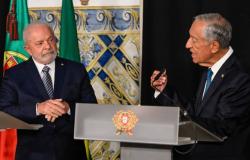RHowever, Waldemar Zurek always carries the Polish Constitution with him. He takes out a small red-brown book, it fits between his thumb and index finger. “Very useful,” says Zurek. ‘This way you can always look something up.’ But the pocket-sized legal text also has a symbolic meaning. “It’s a talisman,” the judge says. The Constitution as a point of reference in difficult times.
Such as the past eight years, in which the right-wing nationalist Law and Justice (PiS) government opened the attack on the Polish constitutional state. And to compatriots like Zurek, who defended her tooth and nail. He knew that. After he was critical of PiS’s attempts to control the legal system and, among other things, went to the European Court, Zurek got into trouble. ‘The previous government did not foresee that a large group of judges would resist.’
The judge from Krakow was transferred to a lower court, the anti-corruption bureau harassed him for years, he was exposed to more than twenty disciplinary cases – ‘among judges I am the record holder’ – and pro-government media conducted a smear campaign against him. That also affected his family. ‘My parents lived in a small village, my mother was respected as a retired teacher. Then they were given the cold shoulder. Her priest asked if she could make me stop my fight against the government.”
About the author
Arnout le Clercq is a Central and Eastern Europe correspondent for de Volkskrant. He lives in Warsaw.
Zurek, and in a sense all of Poland, is now reeling. Last fall, Donald Tusk won a majority in the elections with a pro-European coalition. Since then, developments have followed each other in rapid succession. The public broadcaster was reformed in a lightning offensive, the imprisonment of two PiS leaders plunged the country into political chaos and loyalists of the old party were fired. Every day the newspapers are full of changes at state-owned companies and embassies.
Last week, Tusk was in power for 100 days. His election promise was to get a hundred things done during that period – in reality, despite the whirlwind sweeping through Poland, the government was only able to fully deliver on seventeen. The restoration of the rule of law is high on the agenda, but progress is slow. Recently, Tusk said that most of his plans are “in a phase of implementation,” but he admitted that it is more difficult than expected. He is facing ‘a concrete PiS state’, according to the prime minister.
Honeymoon
PiS has entrenched itself in key institutions such as the Constitutional Court, the National Council for the Judiciary and the Supreme Court. You cannot undo that with the stroke of a pen – unless you are prepared to break the law yourself. Justice Minister Adam Bodnar said in an interview with the newspaper Gazeta Wyborcza that he continues ‘with determination, but without breaking the rules of society and democracy’. Bodnar asks for ‘patience’.
But after the honeymoon of the new government, impatience prevails. Such as with judges like Waldemar Zurek. He is visiting the capital Warsaw for a small-scale meeting of experts to discuss the rule of law – the subject is causing a lot of discussion in Poland these days. “I left my suit at home,” he says with a smile. Today the judge is dressed in a hoodie from the ‘Constitution Tour’, an initiative in which judges traveled through the country to inform Poland about the breakdown of the rule of law.
The election results of last October heralded a major change, says Judge Zurek. ‘Poland feels different. We have returned to democracy. If PiS had won again, I fear that critical judges would have disappeared behind bars.’ But Zurek does not hide his criticism of the new government either: the reforms are going too slowly for him, a voice that is also regularly heard from fellow judges in the public debate.
It is not as if Bodnar does nothing, says Zurek, who – that is his nature as a judge – likes to think and weigh. For example, the minister reformed the Public Prosecution Service and replaced many prosecutors. Several judges at regional courts who are known as bosses of the previous government have been dismissed or suspended.
But the government could, no, should, do more. Take, for example, the National Council for the Judiciary, says Zurek, charged with nominating new judges. By politicizing this body, PiS has strengthened its grip on the judiciary and thus ‘poured concrete over the system’. Approximately 3,200 judges, one-third of the profession, have been put forward by the politically influenced Council.
As for Zurek, the Council must be stopped and questionable judges must be dismissed. ‘I understand that Bodnar is in a difficult situation. But for example in the case of public broadcasting, the government acted quickly, we also need something like that within the rule of law. Now the executioners still walk around among their victims.’
Risky operation
The pace of reforms is indeed slow, says Maciej Kisilowski, associate professor of law at Central European University in Vienna. ‘But an important question is: slow compared to what? Compared to a purely legal idea of what the Polish constitutional state should be? Yes. But compared to how politics works in practice? No.’ For judges, the law is leading, but for Tusk and his associates, politics are also involved.
It is “a risky operation in a divided country,” Kisilowski says. ‘We must not forget that 40 percent of the votes went to parties that are not in government. You have to convince those people that the restoration of the rule of law is a good development and not a coup, as PiS claims.’
PiS is intertwined with the institutions. “They are now acting as if the new government is breaking the law,” says Zurek. “But it is the righting of the injustice that they introduced.” It’s like a broken arm that grows crooked, the judge says. ‘The doctor will say: we have to break your arm again. Not to hurt you, but to heal you.’
Jakub Jaraczewski, who conducts research into the Polish rule of law at think tank Democracy Reporting International, advocates a cautious approach. ‘Poland does not need drastic actions, but a targeted, slow process.’ Minister Bodnar has now devised a package of laws that should achieve this. He recently presented his step-by-step plan in Brussels, where the European Commission responded favorably. Shortly afterwards, Commission President Ursula von der Leyen announced that frozen EU funds for Poland would be unblocked based on these ambitions.
But between dream and action, the Polish president and PiS ally Duda stands in the way. He must sign every new law and can also veto it. Duda hints that legislation regarding judges appointed under his presidency is a “red line.” This means that structural reforms are off the table.
The next presidential elections are in May 2025. It is realistic that the restoration of the rule of law will only really gain momentum under a different president, says Jaraczewski. “But the laws that Duda is now vetoing will already be ready.” In the meantime, Bodnar is moving the needle, with creative solutions that do not require legislative changes.
Clean break
There is no question of a clean break with the past. Zurek experiences this firsthand. “Some disciplinary cases against me are still pending.” When asked about the past few years, Zurek talks quickly, giving numerous examples of when he was harassed. What bothers him most is that the government also targeted his environment. A painful example is a school director who was suspended after receiving Zurek and other judges to teach students about the rule of law. “The signal was that it is dangerous to deal with me – the tool of an authoritarian state.”
It is all still fresh, the impact on his private life is great. ‘They harassed my wife during her pregnancy, it was a period of enormous pressure. Our daughter was born healthy, but later turned out to have a heart condition.’ Zurek has never been able to shake off the idea that it has to do with that stressful period. He also won court cases: in Poland, at the European Court. But at the end of last year, one of those cases was revived by an appeal. ‘My wife thought things would get better after the elections. But the other day she said to me, ‘They will never leave you alone.’
Zurek is not vengeful. ‘I don’t have a resentful personality. As a judge, I would also not want to judge people who have violated the Constitution over the past eight years. I would give them a fair trial, because everyone deserves that. But it could be seen as an act of revenge. We shouldn’t have that.’ What he is: tired. ‘The injustice around us gave us adrenaline, the motivation to continue. Now only the tiredness is left. He leafs through his handy Constitution. ‘I’m exhausted. But we have to keep going.’
Key institutions that the Polish government wants to reform
National Council for the Judiciary – nominates new judges. Before 2018, Council members were elected by other judges, since then by the House of Commons (where PiS had a majority). The party thus exercised political control over the composition of the appointed judges, who are called ‘neo-judges’. There is a law to reverse this.
constitutional Court – tests Polish legislation against the Constitution. Consists of several judges loyal to PiS, some of whom have been unlawfully appointed. Highly controversial for restricting abortion laws in 2020, which sparked major protests in Poland. There is a law to reform the Court.
Supreme Court – highest court in Poland. Consists of several chambers, of which a minority is still independent. Most rooms are filled with ‘neo-judges’.






